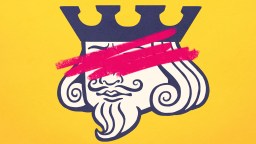Well! Salman Rushdie pretty much predicted the future in his new book, The Golden House, wherein the antagonist is “a ruthlessly ambitious, narcissistic, media-savvy villain sporting makeup and coloured hair.” Read into that what you will, but Rushdie here posits that he’s baffled by the sudden worldwide rejection of knowledge and the elites. He says that it’s not just an invention of the American right wing — that it’s a worldwide problem that’s helped in large part by the likes of Fox News et al — and he wonders both what gave rise to that and how it will stop. Perhaps he’ll have to write a sequel.
Salman Rushdie: Well, I saw a really alarming newspaper article just a week or so ago in which it was—some survey had shown that more than 50 percent of self-identifying Republicans believed that universities were bad for America, really that universities were actually a negative, harmful force in American life.
I mean I had never seen any group of people saying that before, so that was shocking.
And I do think this is not unique to America, because also in England there is a similar kind of distrust of expertise.
In the Brexit vote there—one of the things that came up over and over again was a dislike of experts “telling you what to think”.
And so somehow this mistrust of “people who know things” has become internationalized, it’s not just something about the American Right.
Obviously to somebody who has seen knowledge as being a great virtue and who has spent his life trying to accumulate little bits of it and somebody who thinks of knowledge as a kind of beauty, it’s very discomforting to say the least to have people who think of it as being suspicious. You know, um...
Because what’s happening it seems to me is a strange distortion of the idea of the elite.
If you ask me “What’s an elite?” I would think more about the many, many billionaires sitting in the Trump administration.
Here’s a government with more super-rich people in it than has ever been in any American government, and that government calls college professors and journalists elites.
We’re not the ones with private planes and golf courses in the Bahamas—relatively few novelists have these things. And the idea that we’re the elites, whereas that group, that kind of 0.1 of the 1 percent that considers itself to be in some way possessing the common touch, that just seems like an absurd comic inversion of reality.
I think one of the things we see at the moment, and I tried to in a way capture in the novel, is this idea of a world turned upside down, in which things that one thought of as being normal—solid, believable descriptions of reality—are being stood on their head everyday.
The idea of reality itself, the idea of truth is something verifiable and objective, all these things are being inverted and knocked off their pedestals.
Well, I mean there is a terrible thing which writers sometimes say to each other, which is, “The worse it is the better it is,” because when the world is in a terrible condition there’s a lot to write about.
I mean one demonstration of this is the literature, very often underground literature—the Samizdat literature of the Soviet Union was of an extraordinary quality when there was this colossal adversary of Soviet authoritarianism. Many writers, both in a fiction and nonfiction, rose to that challenge and created extraordinary work.
And I think it’s not unfair to say that the literature of the post Soviet Union, the literature of Russia since 1989, that there is a somewhat of a falling off, that it’s not quite as intense and extraordinary as that earlier work because of the lack of the adversity.
To put it in another way it seems to me that spy fiction was enormously damaged by the loss of the Soviet Union because suddenly, who were the enemy?
So I do think that in times this, which are very adversarial and in which the question of the truth has become so central, there’s a big place for art, there’s a really big role for art to speak up in such a time.
And I think more or less every writer I know in America is considering how best to respond to the place we find ourselves, including me.
Most of this book was written before November the 8th, I mean the vast bulk of it was finished before the election. And I’m sorry to say that I guessed right, that’s to say that I always knew that if things had gone another way that there would’ve had to be some reshaping of a part of the book. (But actually anyway I needed to do a bit of reshaping because things don’t always turn out exactly as you foresee.)
But I wanted to try and capture this strange moment and to tell the truth that part of the novel is very much background rather than foreground, so the actual storyline of the book, what happens to the characters and how they resolve their particular dilemmas, that would not have been altered in any way if the election had gone in another way. I mean the story is the story, but the context of the story, the way in which America developed from the beginning of the Obama administration to the present moment, what happened in that arc of time, that’s the context against which the story takes place.
And there I had to guess and gamble a little bit and then try and fix things right up till the moment the book went to the presses, so that’s more or less—there’s a moment when they take your fingers off the keyboard and say “we’re printing the book today, so you can’t do anymore!” But until that moment I was trying to fix things.






